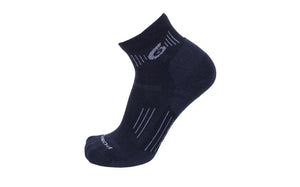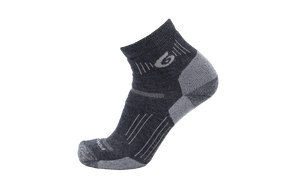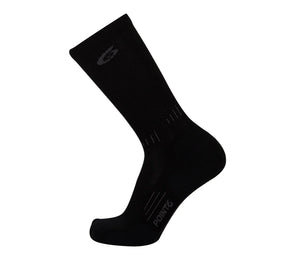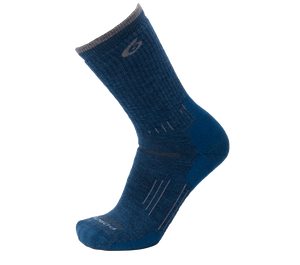Five Minutes With: Legendary Cycling Coach Chris Carmichael
By Ambassador Marty G.
If you know cycling, you know that the name and accomplishments of Chris Carmichael are a part of our sport’s fabric.

Those accomplishments range from being a member of the 1984 Olympic Cycling Team, to “Coach of the Year” by the US Olympic Committee, to authoring eight books on performance.
We had the opportunity to sit down with Chris for a few minutes. And like our last Five Minutes With Olympic Gold Medalist and Performance Coach Joe Jacobi, few individuals have been on the razor’s edge of performance like Chris.
This quick conversation is incredibly rich with Chris’s wisdom, gained through years of helping others succeed. In every one of Chris’s responses, I find a nugget that can help me in all aspects of life.
We’re stoked to bring this to you.
Marty G: Do you feel that process triumphs over results? If yes, why is being process motivated so much more compelling / effective than being outcome oriented?
 Chris Carmichael: At the end of the day, you’re competing to win and you have to go into a competition with that mindset. But unless you are passionate about the process of being an athlete and preparing to perform at your best, you won’t be able to sustain the work needed to put yourself in position to win. A potential result that’s a year in the future won’t get you out of bed when it’s raining sideways. The love of the process and the drive to be better than you were yesterday are what gets people moving. The other big problem with outcome-oriented motivation is that the outcome is often out of your control. You can get a flat tire. Someone could crash in front of you take you out. A competitor might just be better that day. If the outcome is all that matters, that competition is a failure and so was the year of training before it. With process oriented motivation, what matters is arriving at the race with the absolute best chance to win. To arrive having optimized everything you could control.
Chris Carmichael: At the end of the day, you’re competing to win and you have to go into a competition with that mindset. But unless you are passionate about the process of being an athlete and preparing to perform at your best, you won’t be able to sustain the work needed to put yourself in position to win. A potential result that’s a year in the future won’t get you out of bed when it’s raining sideways. The love of the process and the drive to be better than you were yesterday are what gets people moving. The other big problem with outcome-oriented motivation is that the outcome is often out of your control. You can get a flat tire. Someone could crash in front of you take you out. A competitor might just be better that day. If the outcome is all that matters, that competition is a failure and so was the year of training before it. With process oriented motivation, what matters is arriving at the race with the absolute best chance to win. To arrive having optimized everything you could control.
Marty G: Is there something that was your “Truth” in development years, that is no longer their “Truth”?
Chris Carmichael: If you’re asking about my development years as a coach, I would say I used to feel the need to explain everything in minute detail. Young coaches are so enthusiastic about providing athletes with information to handle every scenario, but fail to realize the athlete has to carry all that information. Overloading an athlete with information is the same as overloading them with food, water, or workload. It’s too much, and they can’t figure out what to do with it all. As I matured as a coach, I learned to choose my words more carefully and to give athletes the information that would help them most without overloading them with info that would just burden them.
Marty G: In competing on the world stage, with those who have all of the training and nutritional resources at their fingertips, is there a common factor that is a limiter in performance?
Chris Carmichael: A lot of athletes “overcook the sauce”. They have access to so much technology and so many experts that they think they have to keep adding new activities, or methods, or foods. As events approach they think one more workout or one more thing will make them even better. The best athletes know when to stop. They know when they have done everything they can do and it is time to rest, relax, focus, and just go do it. It takes a lot of confidence to say enough when there is still time left that could be used. Athletes who know themselves well and are confident in their preparation can do that. Athletes who are not confident do too much because they don’t trust that they’ve already done enough.
Marty G: In working with recreational athletes, is there a common factor that is a limiter in performance?
Chris Carmichael: Interruptions. Whether it’s an interruption in the middle of a workout, or interruptions in training due to travel, work priorities, or personal commitments. Interruptions are a big limiter. That said, work sometimes comes first, and family should come before training. Part of my job as a coach is to learn the patterns of an athlete’s life so I can integrate training in a way that honors their other commitments and creates consistency so they can minimize interruptions and make more progress.
Marty G: We know that once baseline metrics are established, that consistency is the key to progression. I find that the workouts are not the hard part, but recovery is - being able to check all of the boxes, everyday; being able to do the right thing, everyday. Within that there are aspects of quality of sleep, controlling stress, diet, etc. With performance recreational riders, is there a trend? A trap that they consistently fall into, and then the wheels come off of their program?
Chris Carmichael: The trap is real life, and as people get busier and we all keep moving faster, it’s harder for people to keep up with all the demands placed on them. The world will take from you as much as you’re willing to give, so athletes who balance sport with career and family need some checks and balances to say yes to the things that matter to them and say no to the things that will just pull them away from what matters. The scenarios are different for each individual, but the challenge is similar. You have to spend the time to discover your purpose and what fulfills you. Then you have to have the autonomy, and discipline, to direct your energy toward those things.
Marty G: Does Confidence create results? Or do results create confidence?
Chris Carmichael: Preparation creates confidence and preparation creates results. If you’ve done the work you can enter any arena knowing you have done everything you can to put yourself in a position to win. If someone is going to beat you, they’ll have to beat you at your best. Part of that preparation, though, is participating and competing in a series of progressively more difficult challenges. The results – wins and failures – from those challenges contribute to an athlete’s confidence.






